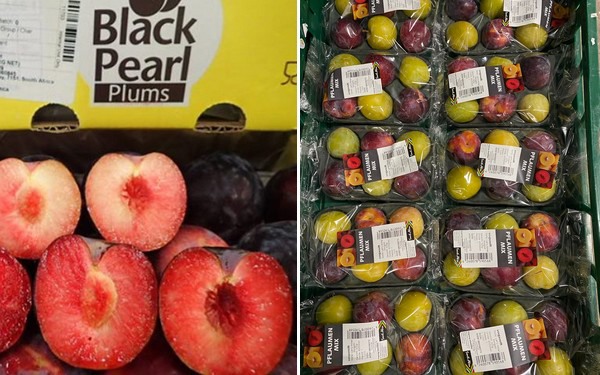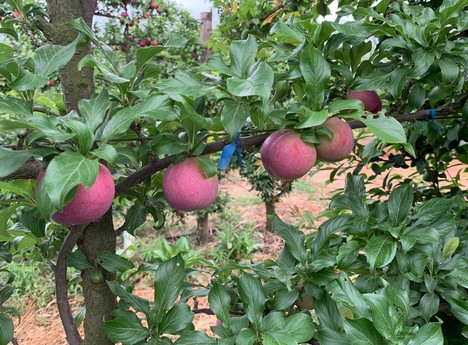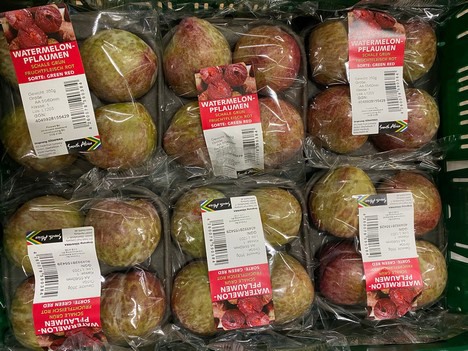The first stone fruits of South African origin are being shipped exceptionally early this year. The first plums, peaches, apricots and nectarines hit the European market as early as the beginning of December. Plums in particular are in direct competition with Italian batches, which may even be available in German food retailers by week 2, sums up Christian Hencke, stone fruit specialist and managing director of FFC Fresh Fruit Company Ltd, based in Hamburg.

Left: Plums dark of the Black Pearl variety.
Right: The plum mix is well received in the food retail trade.
It is mainly in the interest of overseas importers to offer the middle and later varieties, which score with high Brix values and great eating quality, Hencke said. "However, food retailers are still pushing to start the overseas season early. With plums, for example, the better varieties won't arrive until early-mid January. To make matters worse, we have mostly smaller calibers available due to the mild spring and early harvest time."
In other years, he said, early South African produce had a near-monopoly presence in December, but given the presence of Italian plums, he said he is now already observing marketing and price pressure. "All in all, the current demand for plums is somewhat subdued."
Carmingo apricots.
In nectarines and peaches, South African produce is meeting a cleared market without any competition from European residuals. "We are also early in this segment, and so far we are loading mostly small-caliber fruit. Particularly in nectarines, retailers are specifically asking for large fruit, which presents us with major challenges." The second half of the marketing season (from week 2-3) will be decisive, Hencke continues.
"There has been a lot of investment in medium and late nectarine varieties in recent years. Last year, they sold the product by week 15-16, even though the first Spanish fruits were available. This was too late and due to quality problems we had to pay a lot of money. We hope to be able to plan shipments better this year." In contrast to the high-volume nectarines, peaches are establishing themselves primarily as an additional item.
 The Ruby Sun variety will be the highest volume plum this year, with an expected 1.6 million packages.
The Ruby Sun variety will be the highest volume plum this year, with an expected 1.6 million packages.
Apricots: Carmingo varieties on the rise
Smaller caliber apricots dominate the current supply, Hencke says. "At the source, there has been a considerable increase in acreage of Carmingo varieties, which will bear fruit this year. These apricots are available for a relatively short time (week 3-9), but perform very well with great eating quality. Accordingly, we have high expectations from this year's marketing season." The Green Red (watermelon plum) is a relatively new variety, greenish on the outside, deep red on the inside.
The Green Red (watermelon plum) is a relatively new variety, greenish on the outside, deep red on the inside.
In general, rainfall at origin and port strikes are putting significant pressure on the stone fruit sector at the moment. "In the Western Cape, the heavy rains have affected certain plantations, but the yield losses are not yet foreseeable and will only become apparent in the second half of the season. For many growers, however, the rain has been a blessing after a winter that was far too dry. Add to that the strikes at Maersk's APM1+2 terminal in the port of Rotterdam, and that is of course a pure disaster so close to Christmas."
Otherwise, the current sea freight situation is quite stable, according to Hencke. "The port strikes in South Africa were resolved in time with the contracts in October. Container capacities and prices are also stable at the moment, but that can change again at any time."
Growth trend for South African stone fruit
Overall, the South African stone fruit sector has rapidly become more professional in recent years, Hencke affirms. "South Africans are now miles ahead of the Chileans. We as importers have also gained important experience by pre-ripening certain fruits, mainly nectarines, on site, and offering the product in an attractive packaging solution that is as environmentally friendly as possible. This has led to stone fruit becoming our strongest product line."
Images: FFC Fresh Fruit Company Ltd.
For more information:
Christian Hencke
FFC Fresh Fruit Company GmbH
Oberhafenstraße 1
Fruchthof, 2. Stock
D – 20097 Hamburg
Tel.: +49 40/32 52 97 – 28 / – 29
Fax.: +49 40/32 52 97 31
E-Mail: [email protected]
www.freshfc.de
